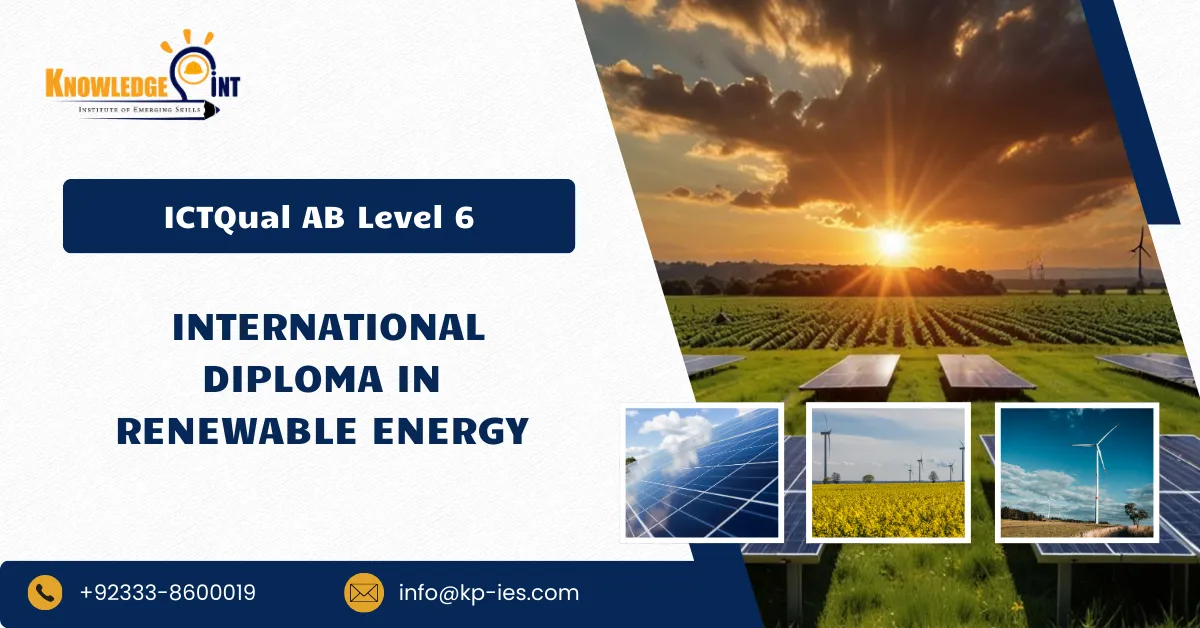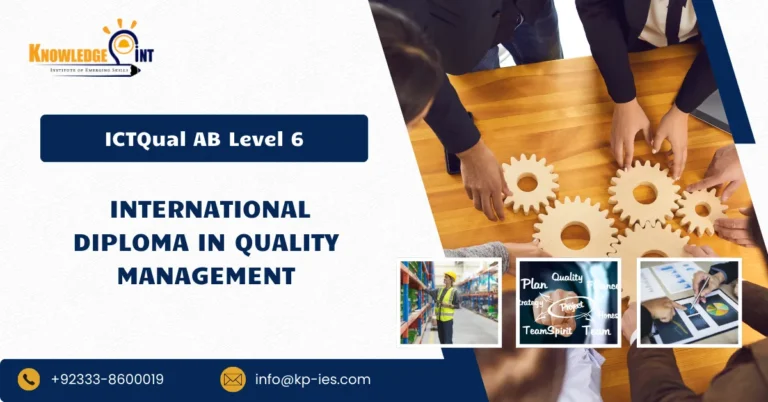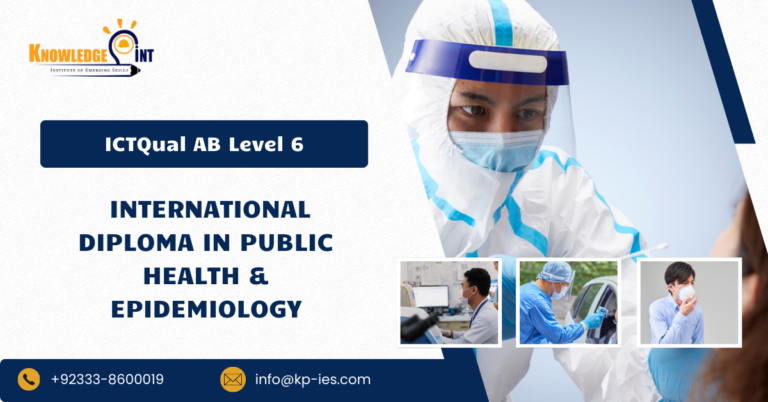The ICTQual AB Level 6 International Diploma in Renewable Energy is a globally recognized qualification designed for professionals aiming to specialize in sustainable and renewable energy technologies. The program equips learners with technical knowledge, practical skills, and strategic capabilities to work across solar, wind, hydro, biomass, and emerging clean energy technologies, with a strong emphasis on energy efficiency, sustainability, and leadership.
The diploma consists of 36 mandatory units, structured over three years, covering foundational, intermediate, and advanced renewable energy knowledge. Learners gain both theoretical understanding and practical expertise, preparing them for a wide range of roles in the renewable energy sector.
Course Overview
This qualification, the ICTQual AB Level 6 International Diploma in Renewable Energy, consists of 36 mandatory units.
Year 1 – Foundation in Renewable Energy
- Principles of Renewable Energy Systems
- Introduction to Sustainable Energy Technologies
- Solar Energy Fundamentals
- Wind Energy Basics and Applications
- Hydroelectric Power Principles
- Biomass and Bioenergy Fundamentals
- Energy Conversion and Storage Basics
- Electrical and Mechanical Principles for Decarbonised Energy
- Health, Safety, and Environmental Awareness
- Laboratory Techniques in Renewable Energy
- Technical Report Writing
- Introduction to Renewable Energy Simulation Software
Year 2 – Intermediate Renewable Energy
- Advanced Solar Photovoltaic Systems
- Wind Turbine Design and Operations
- Hydropower Plant Design and Management
- Biomass Conversion and Biofuel Production
- Energy Storage Systems and Technologies
- Smart Grids and Energy Distribution
- Process Control and Automation in Renewable Energy
- Energy Efficiency and Management Strategies
- Environmental Impact Assessment and Sustainability
- Quality Control and Assurance in Energy Systems
- Project Planning and Technical Communication
- Data Analysis for Renewable Energy Projects
Year 3 – Advanced Renewable Energy
- Advanced Energy Systems Optimisation and Troubleshooting
- Energy Project Management
- Emerging Technologies in Solar and Wind Energy
- Advanced Energy Storage and Battery Technologies
- Smart Grid Integration and Management
- Sustainability and Cleaner Energy Practices
- Risk Assessment and Hazard Analysis in Energy Projects
- Advanced Laboratory Techniques and Field Testing
- Supply Chain and Logistics in Renewable Energy
- Capstone Project in Future Energy Technologies
- Professional Development and Leadership in Energy
- Strategic Decision-Making in Renewable Energy Operations
Learning Outcomes – ICTQual AB Level 6 International Diploma in Renewable Energy
Year 1 – Foundation in Renewable Energy
- Principles of Renewable Energy Systems
- Understand fundamental concepts of renewable energy.
- Identify types of renewable energy systems.
- Apply basic energy conversion principles.
- Introduction to Sustainable Energy Technologies
- Recognize various sustainable energy technologies.
- Understand global energy transition trends.
- Assess benefits and challenges of renewable energy adoption.
- Solar Energy Fundamentals
- Understand solar radiation and photovoltaic principles.
- Apply basic solar energy system design.
- Evaluate efficiency and performance metrics.
- Wind Energy Basics and Applications
- Identify wind energy principles and turbine types.
- Understand wind resource assessment.
- Evaluate suitability of wind energy projects.
- Hydroelectric Power Principles
- Understand hydropower generation processes.
- Analyze water flow and turbine efficiency.
- Apply basic design considerations for small and large-scale projects.
- Biomass and Bioenergy Fundamentals
- Understand sources and types of biomass energy.
- Apply basic biomass conversion methods.
- Evaluate sustainability of bioenergy projects.
- Energy Conversion and Storage Basics
- Understand energy conversion processes.
- Analyze energy storage technologies.
- Recognize efficiency and performance factors.
- Electrical and Mechanical Principles for Decarbonised Energy
- Apply electrical and mechanical principles in energy systems.
- Analyze mechanical and electrical components of renewable plants.
- Ensure safe and efficient system operation.
- Health, Safety, and Environmental Awareness
- Apply safety protocols in energy projects.
- Assess environmental impacts.
- Promote sustainability and responsible practices.
- Laboratory Techniques in Renewable Energy
- Conduct experiments and tests on renewable energy systems.
- Ensure accuracy and safety in laboratory work.
- Interpret and apply lab results to operational scenarios.
- Technical Report Writing
- Prepare professional technical and operational reports.
- Communicate renewable energy data effectively.
- Apply reporting standards and documentation practices.
- Introduction to Renewable Energy Simulation Software
- Use basic simulation tools for energy system modeling.
- Evaluate performance of renewable energy projects.
- Optimize energy systems using digital tools.
Year 2 – Intermediate Renewable Energy
- Advanced Solar Photovoltaic Systems
- Design and analyze advanced PV systems.
- Optimize solar energy production.
- Troubleshoot PV system performance issues.
- Wind Turbine Design and Operations
- Apply advanced wind turbine design principles.
- Understand operational and maintenance requirements.
- Evaluate turbine performance and efficiency.
- Hydropower Plant Design and Management
- Plan and design hydropower plants.
- Manage operational and maintenance processes.
- Assess environmental and social impacts.
- Biomass Conversion and Biofuel Production
- Apply conversion technologies for bioenergy production.
- Optimize biofuel processes.
- Evaluate energy efficiency and environmental sustainability.
- Energy Storage Systems and Technologies
- Understand battery and alternative energy storage methods.
- Optimize storage for energy stability.
- Evaluate system performance and lifecycle.
- Smart Grids and Energy Distribution
- Apply smart grid technologies for efficient energy distribution.
- Integrate renewable energy into grid networks.
- Monitor and optimize grid performance.
- Process Control and Automation in Renewable Energy
- Implement automation strategies in renewable energy systems.
- Monitor performance and safety through control systems.
- Optimize system operations using digital solutions.
- Energy Efficiency and Management Strategies
- Apply energy efficiency techniques in renewable systems.
- Reduce operational costs and environmental impact.
- Implement sustainable management practices.
- Environmental Impact Assessment and Sustainability
- Conduct environmental assessments for projects.
- Apply sustainability principles in renewable energy.
- Ensure compliance with environmental regulations.
- Quality Control and Assurance in Energy Systems
- Apply QA/QC practices in renewable energy projects.
- Monitor system performance and reliability.
- Ensure compliance with international standards.
- Project Planning and Technical Communication
- Develop detailed project plans.
- Communicate technical concepts effectively.
- Collaborate efficiently with stakeholders.
- Data Analysis for Renewable Energy Projects
- Analyze operational and environmental data.
- Apply insights to optimize project outcomes.
- Support decision-making using analytical methods.
Year 3 – Advanced Renewable Energy
- Advanced Energy Systems Optimisation and Troubleshooting
- Optimize multi-source energy systems.
- Troubleshoot operational issues.
- Improve energy production and reliability.
- Energy Project Management
- Apply project management methodologies.
- Develop timelines, budgets, and resource plans.
- Monitor project execution and performance.
- Emerging Technologies in Solar and Wind Energy
- Explore latest innovations in renewable energy.
- Evaluate new technologies for implementation.
- Assess feasibility and sustainability of emerging solutions.
- Advanced Energy Storage and Battery Technologies
- Apply advanced storage solutions for energy stability.
- Optimize battery and alternative storage systems.
- Evaluate performance and lifecycle management.
- Smart Grid Integration and Management
- Integrate renewable systems into smart grids.
- Monitor and manage energy distribution.
- Enhance grid stability and efficiency.
- Sustainability and Cleaner Energy Practices
- Apply cleaner energy technologies.
- Develop sustainable operational strategies.
- Promote carbon reduction initiatives.
- Risk Assessment and Hazard Analysis in Energy Projects
- Conduct detailed risk assessment for energy projects.
- Develop mitigation and emergency response plans.
- Ensure safe and compliant operations.
- Advanced Laboratory Techniques and Field Testing
- Conduct advanced testing of energy systems.
- Apply field data to optimize operations.
- Maintain safety and quality in testing procedures.
- Supply Chain and Logistics in Renewable Energy
- Optimize energy project supply chains.
- Manage logistics of equipment and materials.
- Improve operational efficiency and reduce costs.
- Capstone Project in Future Energy Technologies
- Integrate knowledge into a practical project.
- Apply technical and management skills to real-world challenges.
- Demonstrate professional competence.
- Professional Development and Leadership in Energy
- Develop leadership and management skills.
- Plan career growth in renewable energy sectors.
- Foster teamwork and collaboration.
- Strategic Decision-Making in Renewable Energy Operations
- Apply strategic frameworks in energy management.
- Make informed operational and managerial decisions.
- Lead renewable energy teams and projects effectively.
Course Benefits of ICTQual AB Level 6 International Diploma in Renewable Energy
- Provides in-depth knowledge of solar, wind, hydro, biomass, and emerging energy systems.
- Develops advanced skills in energy storage, smart grids, and process automation.
- Enhances understanding of sustainability, environmental management, and cleaner energy practices.
- Equips learners with project management and strategic decision-making skills.
- Offers practical experience through laboratories, field testing, and simulation software.
- Strengthens problem-solving, data analysis, and technical communication skills.
- Prepares graduates for leadership roles in the renewable energy sector.
- Increases employability in global energy companies, consultancies, and project developers.
- Provides internationally recognized certification in a high-demand and future-focused industry.
- Supports career progression to academic studies or professional certifications in energy.
After completing this course, learners can progress in the following ways:
- Pursue Master’s degrees in Renewable Energy, Sustainable Energy, or Energy Management.
- Obtain professional certifications such as Certified Renewable Energy Professional (REP) or Project Management in Energy.
- Work in roles such as Renewable Energy Engineer, Solar/Wind Project Manager, Energy Analyst, Smart Grid Specialist, or Sustainability Consultant.
- Join global renewable energy companies, government energy projects, or energy consultancy firms.
- Advance into strategic leadership positions, managing large-scale renewable projects.
- Transition into research, innovation, and development roles, focusing on emerging energy technologies and sustainability initiatives.







